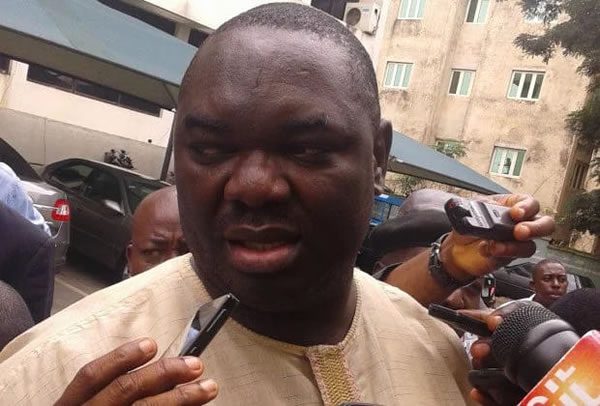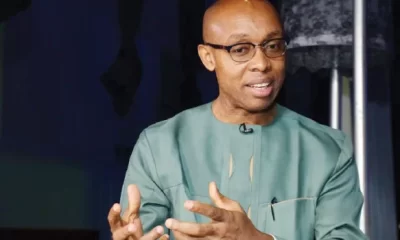National Issues
Giwa and the lingering NFF crisis -By Brig. Gen. Ojo


Chris Giwa
Nigerians are known to love the game of football and that includes this writer. It is even said to be the single most unifying factor in the Nigerian society to an extent that whenever a Nigerian team plays in any international competition, everybody speaks the same language. No Igbo, Hausa or Yoruba. At that period, everybody is a Nigerian. It is also not unusual for traffic on Nigerian roads to disappear anytime an important football match is being played. This is more noticeable in cities like Lagos where gridlocks are a daily occurrence. Incidences also abound of some Nigerian football lovers dying of heart failure after a tense football match. Nigerians’ love for the English Premier League and Spanish La Liga is a further testimony of their great love for the game of football. Simply put, Nigerians love the round leather game!
There is however a historical perspective to football in Nigeria. The history of Nigerian football dates back to the early 20th Century. The man behind the introduction of the game of football to Nigeria was Baron Mulford, a Briton who organised weekly matches between European and Nigerian youths in Lagos. However, the Nigerian Football Association now known as the Nigerian Football Federation was established in 1945. In 1959, the NFA then became affiliated to the Confederation of African Football and also the world body, Federation Internationale de Football Association. The first Chairman of the NFA is Mr Godfrey Amachree.
The NFF recorded remarkable achievements since 1945 when the body was established. However, the 1970s could be said to be the best era for Nigerian football clubs. The Nigerian clubs made waves both at the local and international competitions with many followers and supporters. These clubs include Stationery Stores, IICC Shooting Stars, Rangers International of Enugu, Bendel Insurance, Mighty Jets of Jos, Abiola Babes, Leventis United and Ranchers Bees of Kaduna among others. Each time any of these clubs played, the stadia were always packed full. In 1996, the IICC Shooting Stars of Ibadan won the African Winners Cup for the first time by a Nigerian club. Unfortunately, all these are now history. What we have in Nigeria today in the name of football clubs are far below standard particularly for a country that is so blessed with talented players plying their trade in big clubs all over the world.
It is the same story with the Super Eagles. The Super Eagles which is the national team has won three African Nations’ Cups. These were in 1980 at home, 1994 in Tunisia and 2013 in South Africa. In 1994, the Super Eagles qualified for the FIFA World Cup held in the United States for the first time where they made an impressive debut and were ranked fifth after the competition, the best in the nation’s footballing history. In 1996, the country’s male Olympic football team, known as the Dream Team 1, also won the gold medal at the Atlanta Olympic Games becoming the first African team to win the Olympic football event in history. In the same vein, Nigerian women football team, the Super Falcons, have won the women African Nations Cup a record seven times. In the age grade competitions, Nigerian teams have made impressive outings. In 2003, the Super Falcons were ranked 23 in the world. The Golden Eaglets were the first winners of the U17 World Cup in 1985 and have gone further to win the cup in 1993, 2007 and 2013 and 2015 making them the first team ever to win the cadet World Cup five times.
All these are no mean achievements except that Nigeria could have fared better but for the attitude of those charged with the responsibility of administering the game of football. Instead of building on its past achievements in football, Nigeria is disappointingly retrogressing. Today, the Super Eagles of Nigeria is rated 61th in the world as against fifth after the 1994 World Cup in 1994 while the Super Falcons are rated 38th in 2015 as against 23 in 2003. This downward trend is as a result of an unending crisis in the NFF particularly during elections. Crisis always erupts before, during and after every election into the office of the NFF President.
The current face-off between Chris Giwa and the NFF started during the build-up to the August 26, 2014 election. On July 2, 2014, the Federal High Court in Jos issued an injunction preventing Mallam Aminu Maigari from presiding over the affairs of the NFF. This led to the banning of the NFF and the suspension of the country from international football by FIFA. The ban was eventually lifted following the withdrawal of the case from the court. On the day of the election, Maigari, Musa Amadu and Chris Green were detained by the Department of State Services. The then Vice Chairman, Chief Mike Umeh, conducted the election in the absence of Maigari. The election was won by Giwa with only five delegates present. Thus, the August 26, 2014 election produced a faction led by Giwa as the President of NFF. The world governing body, FIFA, however did not recognise the election.
When Maigari was later released, he presided over the remaining 39 delegates and the election was rescheduled for September 30, 2014. After two rounds of voting, Amaju Pinnick was elected the President of the NFF. The Giwa-led faction since then has refused to accept Pinnick as the NFF President. In the process, they have been in and out of court even when they know that FIFA does not allow football matters to be resolved by the court of law.
The action of Giwa clearly shows that he is a man who does not believe in FIFA statues. If Giwa is interested in the development and progress of the game of football in Nigeria, by now he would have accepted the outcome of the election and FIFA’s decision. His actions are typical of Nigerian politicians and administrators who will go to any length to bring down the country for their selfish ambition. Becoming the NFF President should not be a matter of life and death. Giwa should learn from President Muhammadu Buhari who contested the Presidency four times without bringing down the country.
I wish to appeal to Giwa to allow sleeping dog to lie. The banning of Giwa by CAF will not resolve the NFF crisis. His faction within NFF could be used as a tool to sabotage Pinnick’s administration. If Giwa has no confidence in the ability of Pinnick to successfully run the administration of NFF, let him wait till the end of his tenure when he can contest.
In the case of the Minister of Sports, Solomon Dalung, in my own opinion, he appears to have taken sides. His comment that Nigeria was giving too much attention to FIFA at the expense of our own court is in bad taste. As a lawyer, he should know that FIFA does not approve the resolution of football matters through the court of law but by the Court of Arbitration in Sport. Such utterances instead of helping to douse the burning crisis tend in most cases to inflame it. The minister as the father of all should not be seen to take sides. In general, and not only in football, our sports men and women are outstanding. The problem I insist has always been the sports administrators. Whenever we get the right people to run the administration of sports in Nigeria, it is then and only then that Nigeria will soar like an eagle in the world of sports.
Brig. Gen. Ojo (retd.) wrote in from Lokoja via delemopa@yahoo.com




















